 Originally published in The Clarinet 46/2 (March 2019). Printed copies of The Clarinet are available for ICA members.
Originally published in The Clarinet 46/2 (March 2019). Printed copies of The Clarinet are available for ICA members.
International Spotlight: Chinese Clarinet Development and the CCOM International Clarinet Festival, Beijing
by Yuan Yuan with assistance from SunZhen, ICA Continent Chair for China
(English Version)
Dear clarinet friends from all over the world, I am very happy to share the story of Chinese clarinet development with you. My name is Yuan Yuan, clarinet professor at the China Central Conservatory of Music, Beijing (CCOM).
Chinese clarinet development parallels our country’s development. When I was a student in the 1980s, not so many people in China were learning the clarinet, and I didn’t know much about it. There was no internet, no good editions of scores, and lots of music was hand-copied. People would bring back scores from abroad and Hong Kong, and we would copy them; it was the only way to get the scores. Not many people knew about instruments and accessories either. My first professional mouthpiece was brought back from Hong Kong by a friend. I used it for a really long time, and couldn’t get myself to change it.
In the early development of Chinese clarinetistry, there were some highly respected Chinese clarinetists. They were the first overseas students appointed by our country to study in Eastern Europe and the Soviet Union. My teacher, professor Tao Chunxiao, is a representative. They brought back many clarinet teaching materials and their learning experience, and built the Chinese clarinet teaching system. In the meantime, they promoted the development of Chinese clarinet works that time; some of these works are still very popular now.
With the opening of China, people were paying more and more attention to art. Many of my classmates at CCOM went to America and Europe to study, so academic exchange was becoming more common. What made a big impression on me was the respected professor Guy Dangain’s master class at CCOM – his teaching ideas and recital caused a sensation throughout Beijing. Then every year there were prestigious European and American clarinetists, and educators gave master classes at CCOM, but not very often. I realized the gap between the Chinese and international clarinet playing level by listening to these clarinetists’ recitals and master classes. But at the same time it made me love this marvelous instrument more, and I began to have an infinite vision of the future. I hoped I could be a clarinet teacher.
Eventually in 1997, I was admitted to the Conservatorium van Amsterdam, where I studied with professor Herman Braune. During my two-year study in Holland, I listened to many concerts and gained new understanding of clarinet playing. When I went back to China, my dream came true: luckily, I was appointed clarinet teacher at CCOM and started my clarinet teaching career. I also played in the China Philharmonic since 2005.
The CCOM International Clarinet Festival, Beijing
Eventually in 2013, with the support of CCOM, I founded the CCOM International Clarinet Festival. I believed CCOM, as the best music conservatory in China with its great concert halls and practice rooms, would make the festival progress smoothly.
So far, the festival has been held three times (2013, 2016 and 2018) and invited dozens of international clarinet virtuosos to perform, including Ronald Van Spaendonck, Philippe Berrod, Julien Chabod, Vincent Penot, Min Jo Kim, Laura Ruiz Ferreres, Paul Meyer, Corrado Giuffredi, Milan Rericha, YaoGuang Zhai, Jorge Montilla, Florent Heau, Yuan Gao, Jonathan Cohler, Yue Ma, Weileng Chen, Eddy Vanoosthuyse, Nicolas Baldeyrou, Laszlo Kuti, Mingzhe Wang, Benjamin Lulich, Juan Ferrer, Vitor Fernandes, Masako Miyako and Cristiano Alves. We have also invited many Chinese clarinetists, teachers and students to perform. Each time, the festival gets bigger and bigger. More and more people hope to come to Beijing to participate in the festival to perform and listen to wonderful recitals. In the 2018 festival, the number of participants reached 700. Of course, China is huge. With these years of development, there are more people who love to learn the clarinet. I believe the festival in the future will draw more attention and have more participants.
The CCOM International Clarinet Festival is also a platform for showcasing instrument brands. Each one has an exhibition of clarinet instruments and accessories from throughout the world. We welcome more and more professional clarinet manufacturers to the festival, making closer contact between clarinetists and manufacturers. The scale of each festival is expanding.
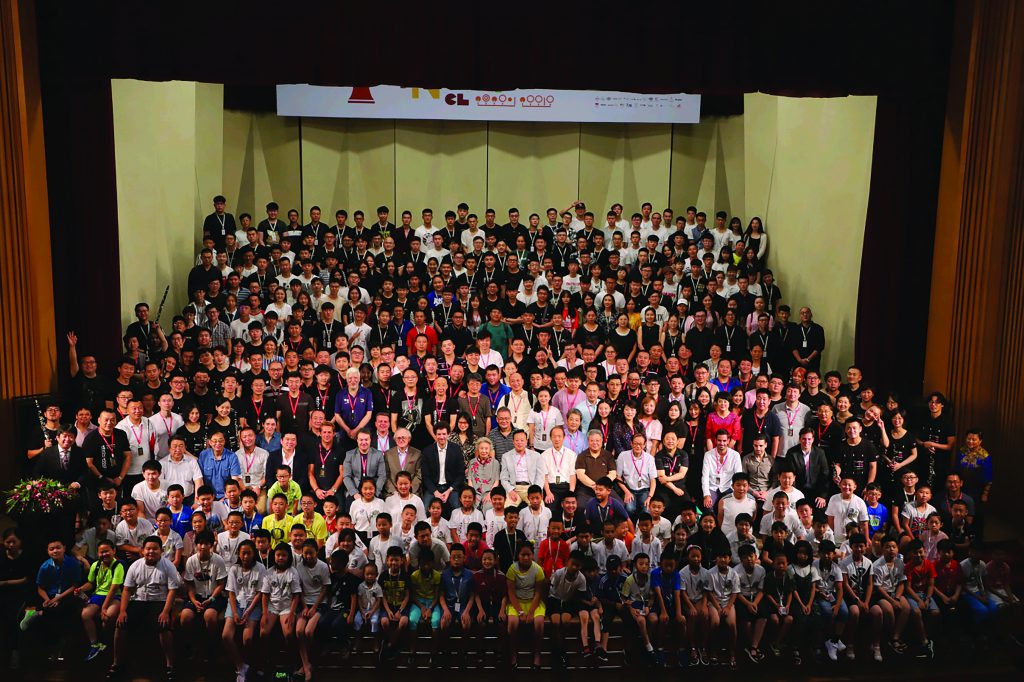
Participants of the CCOM International Clarinet Festival hosted by Yuan Yuan
第三届中央音乐学院国际单簧管艺术节的全家福
Influence of the CCOM International Clarinet Festival on Chinese Clarinet Development
The CCOM International Clarinet Festival in Beijing is the stage of world and Chinese clarinet exchange. It brings the best clarinet virtuosos throughout the world and prize winners from international competitions to the Chinese audience, meanwhile showing excellent young Chinese clarinetists to the world, letting the world get to know them and the Chinese clarinet playing level. This was my original intention in founding this festival. In the meantime, it is also a platform to let Chinese clarinetists know about international instrument brands, and let the world know about Chinese brands.
Each CCOM International Clarinet Festival has a special concert for youth clarinet students. The organizing committee arranges to bring remarkably talented young players and prize winners to the stage. With the developed internet in China today, their impressive performance on live webcasts makes them a hot topic in the Chinese clarinet world.
Each CCOM International Clarinet Festival has a fervent climax. The organizing committee arranges prestigious Chinese clarinet educators and virtuosos to tell the audience their successful experience. In the second festival, a clarinet ensemble formed by three generations of Chinese clarinetists – the older, middle-aged and younger – together performed a concert. Professor Tao Chunxiao served as the concert master. In the decades of Chinese clarinet development, this was the first time such an event had happened. It was a concert that moved everyone, and pushed the festival to a climax. Apparently this concert had historical significance. International clarinet virtuosos’ recitals in the festival have undoubtedly been very popular with the Chinese audience. International clarinet development is changing, too. The Chinese audience is learning not only about different clarinet playing styles, but also about newly composed clarinet works.
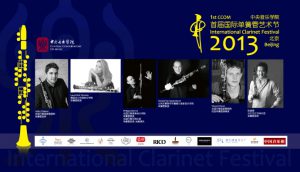
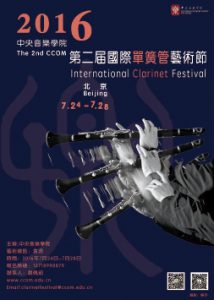
With the continuous development of China’s economy, Chinese families are increasingly supporting their children in their music studies. Clarinet is of course an epitome of this. China is huge, and many schools in every city have established orchestras and wind bands, so there are many kids learning the clarinet. I am sure in China the number of clarinet learners is the largest among the wind instruments. Live webcasts let more people listen to every fantastic recital in the festival.
Music needs exchange, and Chinese clarinetists are eager to know about the directions and news of international clarinet development. With the popularity of clarinet in China today, there is more professional talent, and the level is also continuously improving. There are some young clarinetists who have won prizes at international competitions. Although they are not top competitions, compared with 30 years before, today’s changes are happening so fast, sometimes even to me.
Just because of this, I firmly believe holding the CCOM International Clarinet Festival will absolutely close the distance between Chinese and world clarinet playing. I believe this stage belongs to everyone who loves the clarinet. Let us move beyond language, enjoying each other’s music through our marvelous instrument, the clarinet.
About the Writer
Yuan Yuan is deputy principal clarinet with the China Philharmonic Orchestra and associate professor of clarinet at the China Central Conservatory of Music. Yuan earned First Prize and Special Award for Chinese Work Performance at the First National China Clarinet Competition and First Prize of the First China Woodwind Chamber Music Competition, and has been invited to perform at festivals including the Festival of the Central Conservatory of Music, the Modern Festival of the Central Conservatory of Music, the Xi An International Clarinet Festival, and the Shanghai International Clarinet Festival. His teachers include Yuan Fu Huang, Chun Xiao Tao and Herman Braune.
(Chinese Version)
通过举办北京CCOM国际单簧管艺术节展望中国单簧管的发展
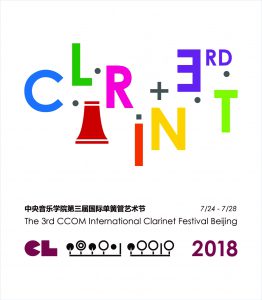
一 介绍中央音乐学院国际单簧管艺术节
亲爱的全世界的单簧管同仁们,很高兴在这里和你们一起分享中国单簧管发展的故事。我是中国北京中央音乐学院的单簧管教授袁源。中国的单簧管发展其实和中国国家的发展是一样的。80年代当我还是学生的时候,中国没有太多人学习单簧管。也不知道太多关于单簧管的咨询。没有网络,没有原版谱,很多作品都是手抄的,那时候只是通过一些人从国外和香港带回来的乐谱相互复印。也不了解单簧管乐器及配件。我的第一个专业的笛头是托朋友从香港带回来的。随后用了很多年,一直不舍得换。中国早期的单簧管发展中,有一批受到尊敬的中国单簧管演奏家,他们是由国家支持派到东欧和当时的苏联去学习的最早一批留学生。我的老师陶纯孝教授就是一个代表。他们带回来单簧管教学的很多资料和她们学习的经验。建立了中国单簧管的教学体系。同时也促进了一些那个年代中国本土的单簧管作品的发展。其中有很作品至今在中国还很受到欢迎。随着中国的开放,人们而对艺术的喜爱。早期和我一起在中央音乐学院学习的同学很多也开始踏上去美国和欧洲的学习之路。于是交流开始多起来。我印象深刻的是尊敬的Guy Dangain 先生在中央音乐学院举办了大师班,他的教学理念和音乐会轰动了整个北京。随后每年都有欧洲和美国著名的演奏家和教育家来中国讲学,但并不是很频繁。通过听这些演奏家们来中国的音乐会和大师课,使我逐渐认识了中国单簧管和世界水品的差距。但同时也更热爱这件乐器,也开始对未来拥有无限的憧憬。希望将来可以当一位单簧管的老师。终于在1997年我考入阿姆斯特丹音乐学院开始我的留学之路。,跟随Herman Braune教授学习。在荷兰的这两年我看了很多音乐会。对演奏单簧管也有了新的认识。 回到中国后,我的梦想成真,很幸运在中央音乐学院任教,开始我的单簧管教学职业生涯。2005年同时也开始在中国爱乐乐团演奏。终于在2013年得到中央音乐学院的支持,我创办了北京中央音乐学院国际单簧管艺术节。我相信中央音乐学院是中国的最高音乐学府。有很好的音乐厅和琴房。将会使得艺术节顺利的进行。至今,艺术节举办了三届。分别是2013、2016、2018年 。 共邀请了几十位国际的单簧管演奏家来表演。有:Ronald Van Spaendonck, Philippe Berrod, Julien Chabod, Vincent Penot, Min Jo Kim, Laura Ruiz Ferreres, Paul Meyer, Corrado Giuffredi, Milan Rericha, YaoGuang Zhai, Jorge Montilla, Florent Heau, Yuan Gao, Jonathan Cohler, Yue Ma, Weileng Chen, Eddy Vanoosthuyse, Nicolas Baldeyrou, Laszlo Kuti, Minzhe Wang, Benjamin Lulich, Juan Ferrer, Vitor Fernandes, Masako Miyako, Cristiano Alves等。同时还邀请了很多中国的单簧管演奏家,老师和学生参加表演。每次的规模都不断扩大,有更多的人希望到北京能参加艺术节表演和观摩到更多更精彩的音乐会。2018年参加的人数就已经达到700人左右。当然,中国很大,随着这些年发展,已经有更多的人喜欢学习单簧管。相信未来的艺术节将会有更多的人关注和参与。
中央音乐学院国际单簧管艺术节也是乐器品牌展示的平台。每次的艺术节都会安排世界各地和中国乐器及配件相关的展览会。也欢迎更多,更专业的单簧管相关厂商参与到艺术节中。使得乐器的使用者和厂商近距离的接触,各取所需,规模每一届都在扩大。
二 中央音乐学院国际单簧管艺术节的影响力,对中国单簧管发展的作用。
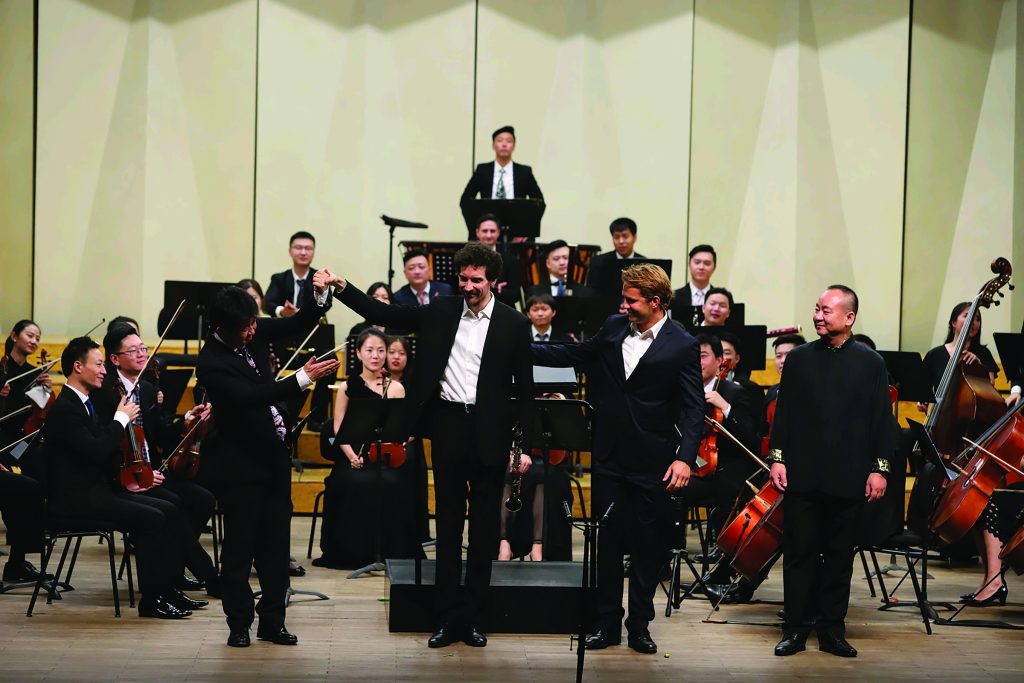
Gala concert of the CCOM International Clarinet Festival 第三届中央音乐学院闭幕式音乐会
北京中央音乐学院国际单簧管艺术节是世界和中国单簧管交流的舞台。将世界各地的最优秀的单簧管演奏家和国际比赛的获奖者介绍给中国的观众,也将中国优秀的年轻单簧管演奏者在艺术节中宣传。让世界了解他们,了解中国的单簧管演奏水品。从创办的初期就确定这样初衷。同时也是让中国的单簧管使用者了解国际乐器品牌, 国际了解中国的乐器的平台。每一届的艺术节都会有青少年单簧管学生的专场音乐会,组委会安排中国各地非常优秀的青年人和比赛获奖者登台表演。在中国互联网发达今天,的他们精彩演出通过网络直播,使得他们成为了全中国单簧管热议的话题。每次的艺术节中都会有热烈的高潮,组委会安排了中国有名单簧管教育家和演奏家为大家讲诉他们的成功经验。记得在第二届艺术节中,中国老中青的单簧管演奏家们一起组成了单簧管乐团演奏了音乐会。陶纯孝先生担任了首席。是中国单簧管发展的几十年里第一次有这样场景。那是令所有人感动的音乐会。将艺术节推向了高潮。很显然这一场音乐会具有历史意义。在国际单簧管演奏家在中央音乐学院国际单簧管艺术节中的表演,无疑一直都受到中国师生的欢迎。世界的单簧管发展也在变化。我除了让中国的观众了解不同演奏风格,也让中国观众了解一些国际上新的单簧管作品。随着中国经济的不断发展,中国家庭越来越支持孩子们学习音乐。单簧管当然就是一个缩影。中国很大,每个城市里的很多学校都组成了交响乐团和管乐团,当然学习单簧管的孩子就有很多,我相信在中国,单簧管是管乐中学习的人数最多的乐器。艺术节通过网络的直播,让更多不能到现场观看的单簧管学生看到艺术节每一场的精彩音乐会。音乐需要交流,中国单簧管演奏者迫切的想知道世界单簧管发展的方向和动态。这些年也因为单簧管在中国的普及。专业人才也不断的增多,水平也不断进步。已经开始有很多年轻人在国际比赛的舞台上获奖。当然还不是顶级赛场。但我相信,和三十年前相比如今的变化,有时候我都觉得太快。正因为如此我坚信举办中央音乐学院国际单簧管艺术节是一定会拉近中国和世界单簧管演奏的距离。我相信这个舞台属于每一个人热爱单簧管的人,让我们享受彼此的音乐而超越语言。
Comments are closed.